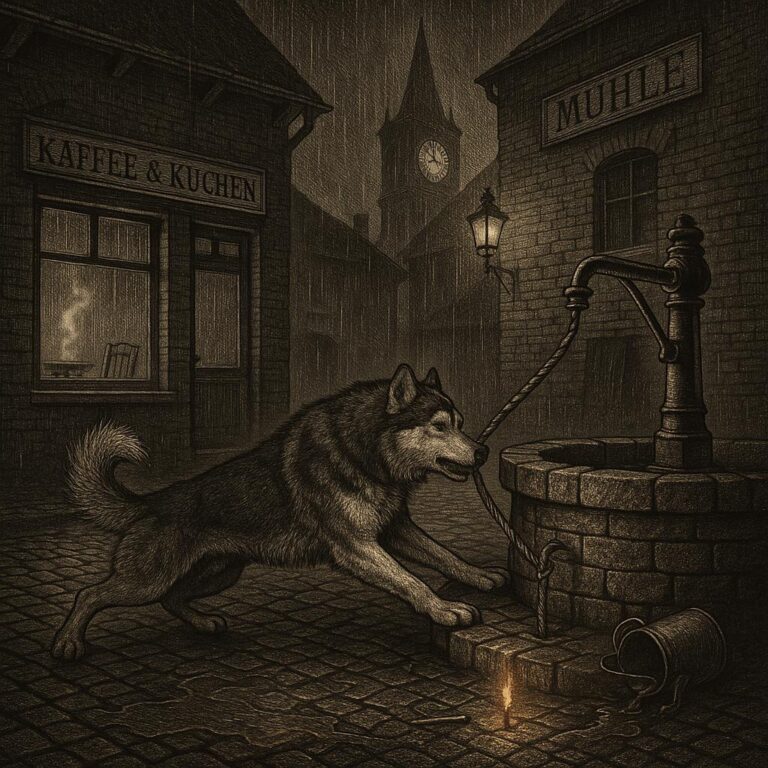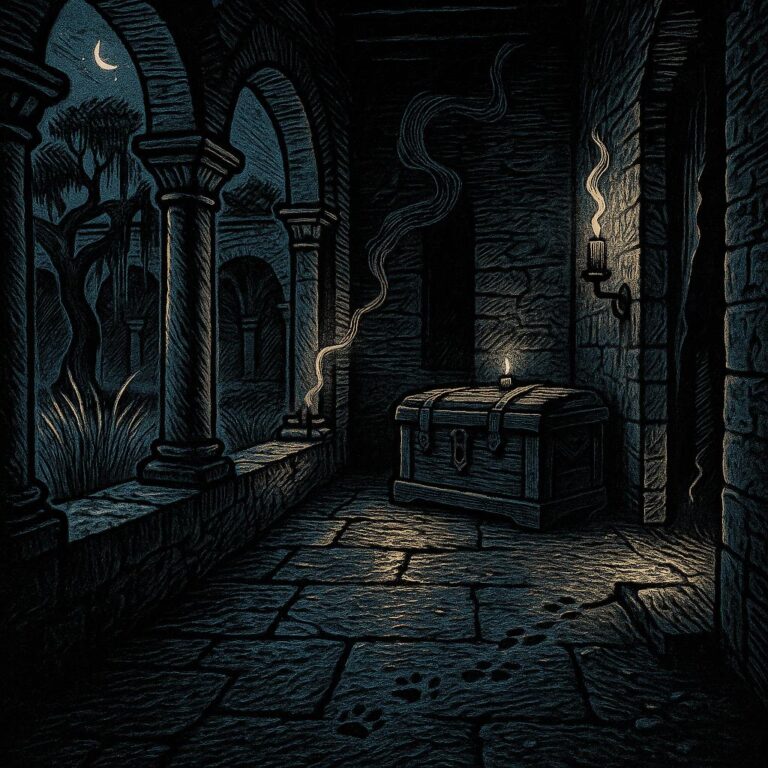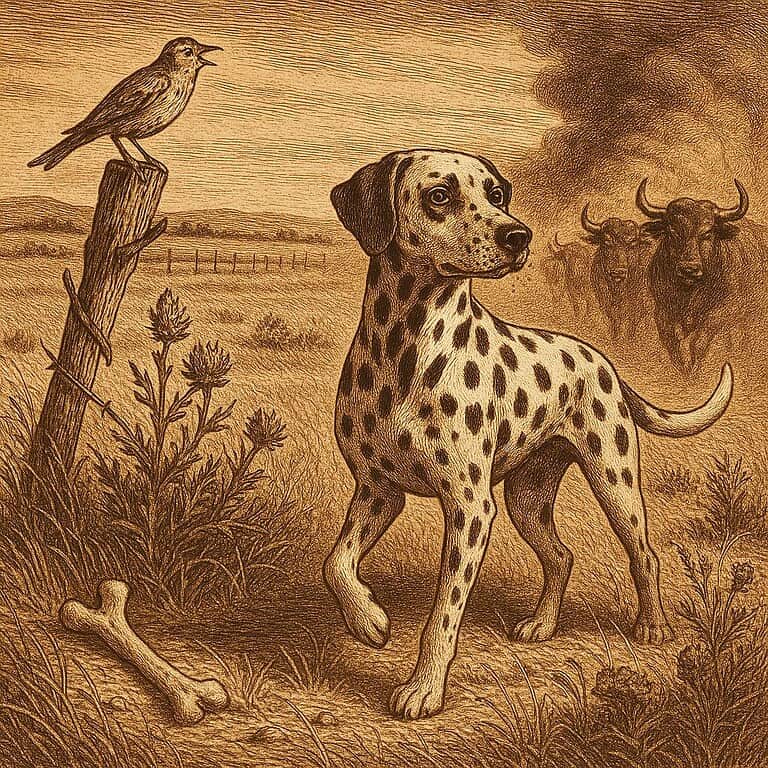Pawprints Older Than the Mountain

Great bells tolled over the cliff monastery as Wangdu, a fourteen year old Lhasa Apso, padded through incense fog. He remembered every prayer flag’s fray, every hidden stair. The novices whispered he could smell tomorrow. They were right. In the abbot’s cell he sensed the air ripple like silk underwater. Fresco eyes blinked, though stone cannot blink, and ancient vow stirred inside his bones. In the courtyard a door that had never existed resolved from mist, carved with pawprints older than the mountain. The abbot reached for the latch, smiling. Wangdu barked once, warning, as it swung inward to reveal
a slope of wind and scent, a valley made of breath instead of rock. Cold blue air pooled just beyond the threshold, and every current carried a different aftertaste: barley roasted on a fire not yet lit, the copper tang of snow that would fall next winter, butter tea someone would spill on a morning that hadn’t arrived. The air of the next hours, the next years, lay there layered like stacked cloth. In that valley a path of pawprints glowed faintly, older than any prayer, pressed into the wind itself.
The abbot’s fingers stopped on the latch. His smile did not falter, but he did not step through. He looked down at Wangdu as one looks at an old friend who is about to do a long thing alone. Wangdu barked again, softer, not warning now but promise. The abbot’s hand withdrew. He inclined his head, a bow you give to a guardian.
Wangdu went forward.
His whiskers trembled as new smells struck him in waves—tomorrows of bread, of rain on juniper, of a child coughing and then not coughing, of a white hare skittering across a monk’s dream. He padded along the prints in the air. Under his paws there was no stone, no snow, yet the path held like the ridge of an old, familiar wall under a night walk. Behind him the great bells tolled once and then quieted, as if the monastery were holding its breath.
Fresco eyes watched; he could feel them. Saints painted when paint was still made from ground stone turned their gaze, not blinking now, but witnessing, which is older.
The path led to a shelf of cloud shaped like a flat rock. On it sat a dog with a muzzle the color of lowered moons. His ruff was tangled with prayer strings. He had the gravity of riverbeds and hearths. When he breathed, Wangdu smelled centuries—yak wool dried in smokehouses, the first rice that ever came up the mountain, the night the cliff cracked and then held.
You have come to redeem a vow, the old dog said, though no mouth moved; the speech was in scent and warmth and paw pressure.
Wangdu lowered his head, not submissive, simply honest. He was small and old. His hips hurt on cold mornings; sleep sometimes stole his hearing for an hour. He knew every crack in every stair, every fish bone tossed from the kitchen window, every place where snow piled deeper than it looked. He knew also the door’s call as you know the weight of your own name.
What will you give? asked the old dog.
Wangdu nosed the air that led back toward the monastery. He smelled what waited: the abbot’s tea cooling regretfully on a table while a bell was mended; a novice hiding a sparrow feather in his sleeve; the first day the clouds would clear after the coming storm; the abbot’s laughter when someone’s chant went gloriously wrong; the sob that would break unannounced during evening prayer and the way eight hands would touch that shoulder, quietly, until the sob passed. Threaded through all of it was the monastery itself, the scent of worn wood and oil and incense, of stone that had soaked up a thousand winters and learned to warm slower.
My body is almost done, Wangdu said to the old dog, simply offering the truth. I will give it.
The old dog rose with the stiffness that happens to kings and beggars alike. He came forward and pressed his nose to Wangdu’s whiskered muzzle. For a heartbeat Wangdu smelled the first time a dog decided to sleep by a human’s door and not the wild road. He smelled ash on fur, and a hand, tentative, scratching an ear.
You do not have to give all, the old dog sent. Only the part that is heavy. Keep the part that remembers the way back.
Wangdu thought of the abbot’s hand pausing at the latch. He thought of the novices’ bare feet slapping in the courtyard. He thought of the goat path he had tumbled down when he was a pup, of the bruise that lasted a week, of the laugh the kitchen woman made, surprised out of her. He thought of lying on sun-warmed flagstones, bones loose, breath slow, the monastery singing around him.
Take my ache, he said. Take the slowness in my hips. Take the white fog that sometimes sits in my ears. Take the piece of fear that wakes me at night when wind slips the wrong way under the eaves. Take the part of tomorrow that is hard for me to carry. Let me carry back what is needed.
The old dog exhaled, and what he exhaled was spring. It moved through Wangdu, lifting heaviness like a blanket pulled off a sleeping child. Heat went out through his paws, then returned, lighter. His spine uncurled a finger’s width. His heart beat twice, then steadied, not younger but unburdened.
One more thing, the old dog said. You must bring back a name, or the door will open each time the mountain forgets itself.
Names had weight in this place. Wangdu stood for a while on the cloud-rock and nosed through futures for one that fit, for a name that would sit in the abbot’s palm like a seed. He tasted many—sharp ones like frost, sweet ones like melted sugar, names with too many syllables that would tangle on a novice’s tongue. He finally found a small, clean syllable lying under the scent of barley and smoke. It smelled like good luck returned, like an old bowl mended with gold.
Tashi, he said, and the name rang softly as if from a far bell tucked under snow.
The old dog’s ears flicked, pleased. Bind it with your breath when you cross, he told Wangdu. Tell your man of it if he asks. He will ask.
The path of pawprints faded as Wangdu turned, but the memory of where it had been was fresh, like a trail just laid in powder. He trotted back, feeling his own gait settle into something he had almost forgotten. The door waited, its carved pads catching a light that was neither sun nor lamp.
On the threshold he stopped. He looked back once. The old dog had lain down again, his head on his paws. Around him the valley of breath billowed, stored tomorrows moving gently like sleeping creatures. Wangdu lifted his muzzle, inhaled the name he had chosen, and let it fill his lungs until it was part of his blood.
He stepped through. The monastery air, seasoned with incense and sweat and iron and yak butter, kissed his face. Sound returned piece by piece—the murmur of prayer, the far mutter of water, the small scratch of a paintbrush on stone as some fresco eye resumed being paint and not attention. The abbot was kneeling with his hands on his knees, eyes damp, not from fear.
“Well?” he asked quietly, though there were a dozen answers possible, and perhaps none needed.
Wangdu padded forward until his chest touched the abbot’s robes. He exhaled warm against the old man’s wrist, and spoke the binding in the way dogs speak to people—with breath, with gaze, with the slow tilt of the head that places one syllable precisely where it will be kept. The abbot nodded once. He put his forehead to Wangdu’s forehead. The latch slipped free of his fingers; the door eased shut without sound. Where it had been, mist drew itself back into itself and became only morning.
The vow inside his bones settled. Not gone, not finished—vows like this were a way of walking, not a task—but quieted, like a bell set down carefully.
That night, wind pestered the windows, as it does. Wangdu slept on the stone just outside the abbot’s door, as he had when he was young and when he was older and now, something in between. He dreamed of running, but not away. In the dream he ran the length of the prayer flags and their frayed ends did not catch him; they simply touched his back as he passed, blessing, blessing.
Snow came in the morning. The novices squealed and tried to swallow their laughter in their sleeves and failed. The abbot lifted his tea and smiled when he spilled a little and did not mind. Wangdu went to the courtyard and tested the places where the snow hid hollows and the places where it had crust. He felt his paws find what they needed. He shook himself. The air smelled like the clean name he had brought.
By noon a woman from the village arrived with a bundle tucked under her coat. She held it like something found at the edge of a path. Inside the scrap of wool was a pup, all tuft and breath and wriggling impulse. Her eyes were still filmed with the blue of newness. She smelled unmistakably of doorways and mist and the abbot’s robe, and under that, of the sweet bush where the monastery bees swarmed in summer.
“I found her by the east steps,” the woman said, trying to make the story small enough for language. “She was just… there.”
The abbot bent and gathered the pup. Wangdu sat beside his foot. The pup turned her blunt nose toward him and then toward the bell rope and sneezed. The monks laughed because sometimes the gods are plain with their jokes.
“What will you call her?” the woman asked.
The abbot looked at Wangdu. Wangdu looked back, steady as always. The answer was already in the room, light as steam.
“Tashi,” the abbot said.
The paint on the fresco saints had dried years ago, and yet for a breath the room felt looked at, not by paint, not even by eyes, but by attention that had gone ahead to make sure the way was there and had been waiting patiently for the rest of them to come along.
That evening the bells tolled again, not because a door opened, but because it was the hour they always rang. They sounded ordinary, which is to say, perfect. Wangdu lay with his chin on his paws, the pup puzzling at his ear with her tiny teeth. Tomorrow smelled like barley, like snow melting in a black pot, like a small clean name. The door was part of the mountain again. The monastery breathed. He slept.






